CAIRO, (Reuters) – Hosni Mubarak stepped down as Egypt’s president today, handing over to the army and ending three decades of autocratic rule, bowing to escalating pressure from the military and protesters demanding that he go.
Vice President Omar Suleiman said a military council would run the affairs of the Arab world’s most populous nation. A free and fair presidential election has been promised for September.
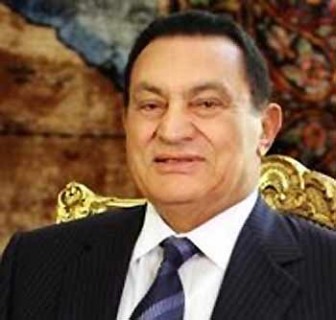
A speaker made the announcement in Cairo’s Tahrir Square where hundreds of thousands broke down in tears, celebrated and hugged each other chanting: “The people have brought down the regime.” Others shouted: “Allahu Akbar (God is great).
The 82-year-old Mubarak’s downfall after 18 days of unprecedented mass protests was a momentous victory for people power and was sure to rock autocrats throughout the Arab world and beyond.
Egypt’s powerful military gave guarantees earlier today that promised democratic reforms would be carried out but angry protesters intensified an uprising against Mubarak, marching on the presidential palace and the state television tower.
It was an effort by the army to defuse the revolt but, in disregarding protesters’ key demand for Mubarak’s ouster now, it failed to calm the turmoil that has disrupted the economy and rattled the entire Middle East.
The military’s intervention was not enough.
The tumult over Mubarak’s refusal to resign had tested the loyalties of the armed forces, which had to choose whether to protect their supreme commander or ditch him.

The sharpening confrontation had raised fear of uncontrolled violence n the most populous Arab nation, a key U.S. ally in an oil-rich region where the chance of chaos spreading to other long stable but repressive states troubles the West.
Washington has called for a prompt democratic transition to restore stability in Egypt, a rare Arab state no longer hostile to Israel, guardian of the Suez Canal linking Europe and Asia and a major force against militant Islam in the region.
The army statement noted that Mubarak had handed powers to govern the country of 80 million people to his deputy the previous day — perhaps signalling that this should satisfy demonstrators, reformists and opposition figures.
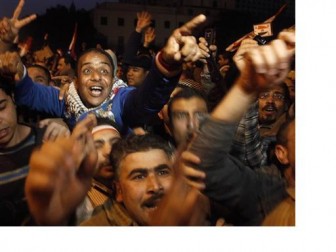
“This is not our demand,” one protester said, after relaying the contents of the army statement to the crowd in Cairo’s central Tahrir Square. “We have one demand, that Mubarak step down.” He has said he will stay until September elections.
The Muslim Brotherhood, an Islamist opposition group, urged protesters to keep up mass nationwide street protests, describing Mubarak’s concessions as a trick to stay in power.
REFORMS TOO LITTLE TOO LATE
Hundreds of thousands of protesters rallied across Egypt, including in the industrial city of Suez, earlier the scene of some of the fiercest violence in the crisis, and the second city of Alexandria, as well as in Tanta and other Nile Delta centres.
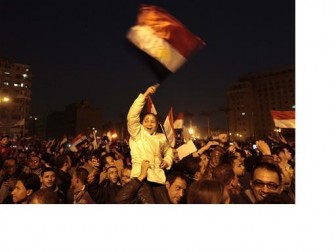
The army also said it “confirms the lifting of the state of emergency as soon as the current circumstances end”, a pledge that would remove a law imposed after Mubarak became president following Anwar Sadat’s assassination in 1981 and that protesters say has long been used to stifle dissent.
It further promised to guarantee free and fair elections and other concessions made by Mubarak to protesters that would have been unthinkable before Jan. 25, when the revolt began.
But none of this was enough for many hundreds of thousands of mistrustful protesters who rallied in cities across the Arab world’s most populous and influential country on Friday, fed up with high unemployment, a corrupt elite and police repression.
Since the fall of Tunisia’s long-time leader Zine al-Abidine Ben Ali, which triggered protests around the region, Egyptians have been demonstrating in huge numbers against rising prices, poverty, unemployment and their authoritarian regime.
EMERGENCY LAWS
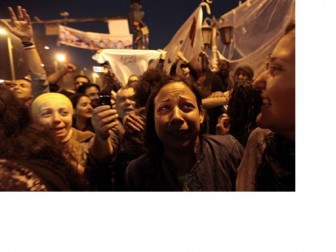
World powers had increasingly pressured Mubarak to organise an orderly transition of power since the protests erupted on Jan. 28 setting off an earthquake that has shaken Egypt sending shock waves around the Middle East.
Mubarak, 82, was thrust into office when Islamists gunned down his predecessor Anwar Sadat at a military parade in 1981.
The burly former air force commander has proved a far more durable leader than anyone imagined at the time, governing under emergency laws protesters say were used to crush dissent.
The president has long promoted peace abroad and more recently backed economic reforms at home led by his cabinet under Prime Minister Ahmed Nazif. But he always kept a tight lid on political opposition.
Mubarak resisted any significant political change even under pressure from the United States, which has poured billions of dollars of military and other aid into Egypt since it became the first Arab state to make peace with Israel, signing a treaty in 1979.
US President Barack Obama’s statement
U.S. President Barack Obama made the following statement today after the decision of Egyptian President Hosni Mubarak to step down. Here is a text of Obama’s remarks:
“Good afternoon, everybody. There are very few moments in our lives where we have the privilege to witness history taking place. This is one of those moments. This is one of those times. The people of Egypt have spoken, their voices have been heard, and Egypt will never be the same.
“By stepping down, President Mubarak responded to the Egyptian people’s hunger for change. But this is not the end of Egypt’s transition. It’s a beginning. I’m sure there will be difficult days ahead, and many questions remain unanswered. But I am confident that the people of Egypt can find the answers, and do so peacefully, constructively, and in the spirit of unity that has defined these last few weeks. For Egyptians have made it clear that nothing less than genuine democracy will carry the day.
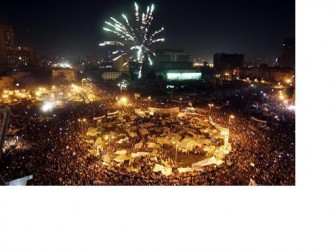
“The military has served patriotically and responsibly as a caretaker to the state, and will now have to ensure a transition that is credible in the eyes of the Egyptian people. That means protecting the rights of Egypt’s citizens, lifting the emergency law, revising the constitution and other laws to make this change irreversible, and laying out a clear path to elections that are fair and free. Above all, this transition must bring all of Egypt’s voices to the table. For the spirit of peaceful protest and perseverance that the Egyptian people have shown can serve as a powerful wind at the back of this change.
“The United States will continue to be a friend and partner to Egypt. We stand ready to provide whatever assistance is necessary — and asked for — to pursue a credible transition to a democracy. I’m also confident that the same ingenuity and entrepreneurial spirit that the young people of Egypt have shown in recent days can be harnessed to create new opportunity — jobs and businesses that allow the extraordinary potential of this generation to take flight. And I know that a democratic Egypt can advance its role of responsible leadership not only in the region but around the world.
“Egypt has played a pivotal role in human history for over 6,000 years. But over the last few weeks, the wheel of history turned at a blinding pace as the Egyptian people demanded their universal rights.
“We saw mothers and fathers carrying their children on their shoulders to show them what true freedom might look like.
“We saw a young Egyptian say, “For the first time in my life, I really count. My voice is heard. Even though I’m only one person, this is the way real democracy works.”
“We saw protesters chant “Selmiyya, selmiyya” — “We are peaceful” — again and again.
“We saw a military that would not fire bullets at the people they were sworn to protect.
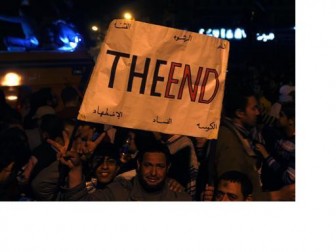
“And we saw doctors and nurses rushing into the streets to care for those who were wounded, volunteers checking protesters to ensure that they were unarmed.
“We saw people of faith praying together and chanting, ‘Muslims, Christians, We are one.’ And though we know that the strains between faiths still divide too many in this world and no single event will close that chasm immediately, these scenes remind us that we need not be defined by our differences. We can be defined by the common humanity that we share.
“And above all, we saw a new generation emerge — a generation that uses their own creativity and talent and technology to call for a government that represented their hopes and not their fears; a government that is responsive to their boundless aspirations. One Egyptian put it simply: Most people have discovered in the last few days — that they are worth something, and this cannot be taken away from them anymore, ever.
“This is the power of human dignity, and it can never be denied. Egyptians have inspired us, and they’ve done so by putting the lie to the idea that justice is best gained through violence. For in Egypt, it was the moral force of nonviolence — not terrorism, not mindless killing — but nonviolence, moral force that bent the arc of history toward justice once more.
“And while the sights and sounds that we heard were entirely Egyptian, we can’t help but hear the echoes of history — echoes from Germans tearing down a wall, Indonesian students taking to the streets, Gandhi leading his people down the path of justice.
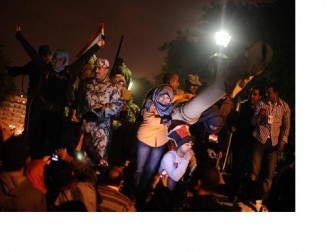
“As Martin Luther King said in celebrating the birth of a new nation in Ghana while trying to perfect his own, “There is something in the soul that cries out for freedom.” Those were the cries that came from Tahrir Square, and the entire world has taken note.
“Today belongs to the people of Egypt, and the American people are moved by these scenes in Cairo and across Egypt because of who we are as a people and the kind of world that we want our children to grow up in.
“The word Tahrir means liberation. It is a word that speaks to that something in our souls that cries out for freedom. And forevermore it will remind us of the Egyptian people — of what they did, of the things that they stood for, and how they changed their country, and in doing so changed the world.
Thank you.
Swiss freeze possible Mubarak assets
ZURICH, – Switzerland has frozen assets that may belong to Hosni Mubarak.
“I can confirm that Switzerland has frozen possible assets of the former Egyptian president with immediate effect,” spokesman Lars Knuchel said soon after Mubarak bowed to 18 days of mass protests. “As a result of this measure any assets are frozen for three years.”
He did not say how much money was involved or where it was.
Assets belonging to Mubarak’s associates would also be targeted so as to limit the chance of state funds being plundered, the ministry said. Mubarak and his associates would be prevented from selling or otherwise disposing of property, notably real estate.
In recent years, Switzerland has worked hard to improve its image as a haven for ill-gotten assets.
It has also frozen assets belonging to Tunisia’s former president Zine al-Abidine Ben Ali, ousted by popular protests last month, and Ivory Coast’s Laurent Gbagbo, who has refused to step down after an election which the outside world says he lost.
Reaction to fall of Mubarak around the world
* EUROPEAN UNION
— “The EU respects President Mubarak’s decision today. By standing down, he has listened to the voices of the Egyptian people and has opened the way to faster and deeper reforms,” EU Foreign Policy Chief Catherine Ashton said.
“It is important now that the dialogue is accelerated leading to a broad-based government which will respect the aspirations of, and deliver stability for, the Egyptian people.”
“The future of Egypt rightly remains in the hands of the Egyptian people. The EU stands ready to help in any way it can.”
* ISRAEL
— “It’s too early to foresee how (the resignation) will affect things,” a senior Israeli official said. “We hope that the change to democracy in Egypt will happen without violence and that the peace accord will remain.”
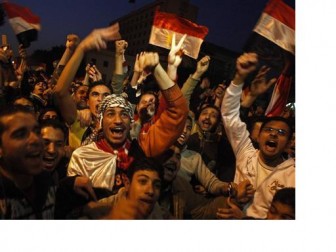
* GAZA
— “The resignation of Egyptian President Hosni Mubarak is the beginning of the victory of the Egyptian revolution,” said Hamas spokesman Sami Abu Zuhri.
“Such a victory was the result of the sacrifices and the steadfastness of the Egyptian people,” he said.
“We call upon the new Egyptian leadership to take an immediate decision to lift the blockade of Gaza and open Rafah (border) crossing permanently to allow people’s free movement and in order for the reconstruction process of Gaza to begin,” Abu Zuhri said.
* GERMANY
— “Today is a day of great joy,” German Chancellor Angela Merkel told a news conference. “We are all witness to an historic change. I share the joy of the people of Egypt, with the millions of people on the streets of Egypt.”
* ARAB LEAGUE
— “I look forward to the future to build a national consensus in the coming period. There is a big chance now and a window has opened after this white revolution and after the president’s concession,” the Egyptian secretary-general of the Arab League, Amr Moussa, Al Arabiya television.
Asked if he was interested in being president, he said: “This is not the time to talk about that … As an Egyptian citizen, I am proud to serve my country with all the others at this stage, to build a consensus of opinion.”
* QATAR
— “This is a positive, important step towards the Egyptian people’s aspirations of achieving democracy and reform and a life of dignity,” said a statement from the Emir’s royal council said.





